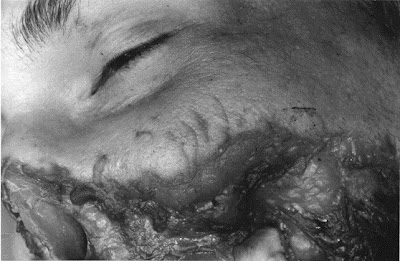 |
| via Documenting Reality |
 |
| Soft tissue defect of the nose due to gnawing by mice. Irregular serrated wound margins with circumscribed 1–2-mm intervals within. Note the absence of vital subcutaneous bleeding. - LINK |
 |
| Detail of the left cheek. The wound edge of the postmortem animal scavenging injury shows no vital subcutaneous bleeding or other wound reactions. Evidence of typical scratch mark-like abrasions in the skin at the wound edge caused by the teeth of a grown Alsatian. - LINK |
 |
| Circular soft tissue defect on the back of the left hand due to postmortem rat activity as found at autopsy.- LINK |
 |
| A 31-year-old man, suicide by shooting himself in the mouth. Extensive postmortem scavenging injuries by the deceased's Alsatian in the lower half of the face and on the neck. Large pieces of skin as well as subcutaneous fatty tissue in these areas are missing, the muscles are exposed. No vital subcutaneous bleeding or wound reactions on the wound surface. - LINK |
 |
| Large soft tissue defect on the left side of the face due to postmortem mice activity.- LINK |
 |
| Soft tissue defect on the back of the hand with finely scalloped and serrated wound margins and focal distinct parallel cutaneous lacerations, diagnostic for tooth marks of rodent origin.- LINK |
 |
| Multiple crater-like hollow defects on the previously clothed back of the body caused postmortem by mice. Inset: close-up view on one of the defects. Note the scalloped and serrated wound margin.- LINK |
 |
| Circular soft tissue defects around both eyes due to mixed rodent activity.- LINK |
 |
| Scavenging postmortem crawfish on A 60-year-old woman found dead immersed in 2 m of water in an artificial lake.The divers, on discovering the body, observed numerous crawfish near the face, the abdomen and the hands of the cadaver that disappeared at their approach. Initial position of corpse resting on the back against bottom (A) with a crawfish in hairs (B). - LINK |
 |
| Macroscopic aspect of injuries of the eyelids - LINK |
 |
| Extensive hemorrhagic lesions of the lips - LINK |
Part I can be found here
No comments:
Post a Comment